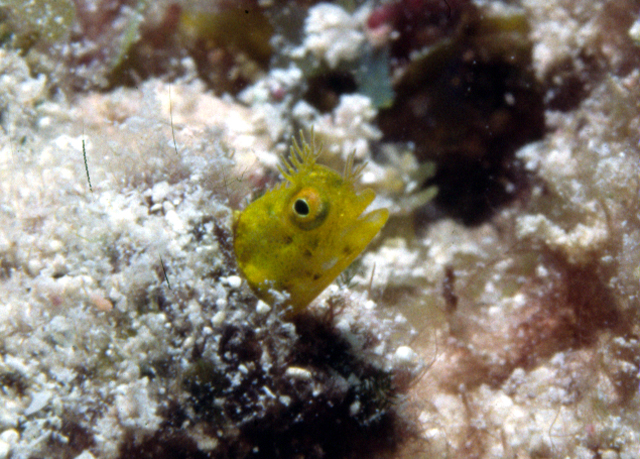| Chaenopsidae (Pike-, tube- and flagblennies) |
| 4.5 cm TL (male/unsexed) |
|
demersal; depth range 2 - 12 m |
| Western Atlantic: southeastern Florida, USA and the Bahamas. |
|
Anal spines: 2-2. Species distinguished by: dorsal fin consisting of spines and segmented rays; total dorsal-fin elements usually 39 or more; posterior third of supraorbital flange crenulate, without spines; fleshy lateral margins of interorbital region with row of 3 to 6 blunt papillae; spiny processes on head poorly developed, when present consisting of a few knobby projections; supraorbital cirrus moderately to strongly branched, cranial spines not short and blunt; patch of cranial spines on nape ends anterior to supratemporal commissural pore; inner rim of posterior infraorbital bone smooth; two or more rows of teeth on each palatine bone; no large, eye-diameter sized dark blotch on side of head posterior to eye. Common amongst Chaenopsids: small elongate fishes; largest species about 12 cm SL, most under 5 cm SL. Head usually with cirri or fleshy flaps on anterior nostrils, eyes, and sometimes laterally on nape; gill membranes continuous with each other across posteroventral surface of head. Each jaw with canine-like or incisor-like teeth anteriorly; teeth usually also present on vomer and often on palatines (roof of mouth). Dorsal-fin spines flexible, usually outnumbering the segmented soft rays (numbering 7 to 37), spinous and segmented-rayed portions forming a single, continuous fin; 2 flexible spines in anal fin; pelvic fins inserted anterior to position of pectoral fins, with 1 spine not visible externally and only 2 or 3 segmented (soft) rays; all fin rays, including caudal-fin rays, unbranched (simple). Lateral line absent. Scales absent (Ref.52855). |
| Inhabits limestone slopes rather than patch reefs; these slopes usually are dotted with small corals, sea urchins, etc. (Ref. 5521). |
|
(Ref. 96402)
|
| harmless |
|
Source and more info: www.fishbase.org. For personal, classroom, and other internal use only. Not for publication.
Page created by Jen, 05.08.02,
php script by kbanasihan 06/09/2010 ,
last modified by
dsantos, 20/08/10

